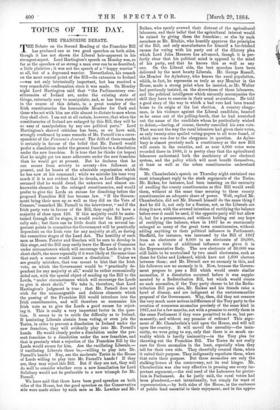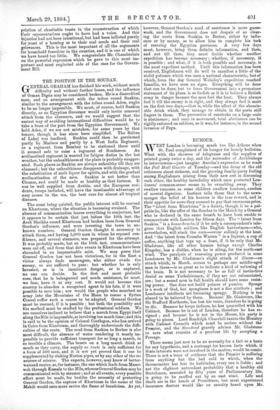TOPICS OF THE DAY
•
THE FRANCHISE DEBATE.
T Debate on the Second Reading of the Franchise Bill
THE has produced one or two good speeches on both sides, though it has not shown the Liberal heir-apparent in his strongest aspect. Lord Hartington's speech on Monday was, so far as the speeches of so strong a man ever can be so described, a little plaintive ; it was not the speech of a "happy warrior" at all, but of a depressed warrior. Nevertheless, his remark on the most central point of the Bill—its extension to Ireland —was not only intrinsically important, but has received a very remarkable confirmation since it was made. On Monday night Lord Hartington said that "the Parliamentary con- stituencies of Ireland are, under the existing state of things, extremely easy to manipulate, and, as has been stated in the course of this debate, in a great number of the Irish constituencies the honourable Member for Cork and those who act with him are able almost to dictate to men whom they shall elect. I am not at all certain, however, that when the constituencies of Ireland are enlarged by this Bill, they will be so easy of manipulation by any one political party." Lord Hartington's shrewd criticism has been, as we have said, strongly confirmed by some remarks of Mr. Parnell's to a corre- spondent of the Freeman's Journal. The drift of those remarks is certainly in favour of the belief that Mr. Parnell would prefer a dissolution under the present franchise to a dissolution under the new franchise. It is true that he thinks (or hopes) that he might get ten more adherents under the new franchise than he would get at present. But he declares that he can secure from seventy to seventy - five followers at present, and he boasts of the admirable organisation which he has now at his command ; while we mistake his tone very much if it is not evident that he dreads, as Lord Hartington assumed that he would dread, the unknown and almost un- knowable element in the enlarged constituencies, and would prefer to give the Lords an excuse for dissolving before the proposed Franchise Bill has become law. "If the Govern- ment bring their men up as well as they did on the Vote of Censure," remarked Mr. Parnell to the interviewer," and if the Irish party vote in favour of the Bill, they ought to have a majority of close upon 120. If this majority could be main- tained through all its stages, it would render the Bill practi- cally safe ; but there can be little doubt that on several im- portant points in committee the Government will be practically dependent on the Irish vote for any majority at all, as during the committee stages of the Land Act. The hostility of such men as Messrs. Forster and Goschen will be sure to develop in this stage, and the Bill may easily leave the House of Commons under circumstances which will encourage the Lords to give it short shrift, the more especially if it were likely at the same time that such a course would insure a dissolution." Unless we are greatly mistaken' that was meant to hint that the Irish vote, on which the Government would be "practically de- pendent for any majority at all," would be rather economically doled out, with the special object of sending up the Bill to the Lords, "under circumstances which will encourage the Lords to give it short shrift." We take it, therefore, that Lord Hartington's judgment is true ; that Mr. Parnell does not wish for the unmanageable and dubious elements which the passing of the Franchise Bill would introduce into the Irish constituencies, and will therefore so economise his Irish vote as to give the Lords a good excuse for reject- ing it. This is really a very important factor in the. ques- tion. It seems to us to settle the difficulty as to Ireland. If hesitating Liberals abstain from voting, or even join the Tories, in order to prevent a dissolution in Ireland under the new franchise, they will evidently play into Mr. Parnell's hands. He would clearly prefer a dissolution under the pre- sent franchise to a dissolution under the new franchise, and that is precisely what a rejection of the Franehise Bill by the Lords would secure for him. Are the vacillating Liberals,— if vacillating Liberals there be,—willing to play into Mr. Parnell's hands Nay, are the moderate Tories in the House of Lords willing to play into Mr. Parnell's hands ? If they are, they may reject this Bill. But if they are not, they will do well to consider whether even a new humiliation for Lord Salisbury would not be preferable to a new triumph for Mr. Parnell.
We have said that there have been good speeches on both sides of the House, but the good speeches on the Conservative side were made either by such men as Mr. Lowther and Mr.
Raikes, who openly avowed their distrust of the agricultural labourers, and their belief that the agricultural interest would be ruined by giving them the franchise ; or else by such members as Mr. Ritchie, who heartily approves the principles of the Bill, and only manufactures for himself a far-fetched excuse for voting with his party out of the dilatory plea which Lord John Manners has advanced, though it is per- fectly clear that his political mind is opposed to the mind of his party, and that he knows this as well as any one. On the Liberal side, the best speeches have been delivered by the most hearty Liberals. Mr. George Russell,. the Member for Aylesbury, who knows the rural population, which, in fact, he represents as truly as any Member in the House, made a strong point when he insisted, as Mr. Walter had previously insisted, on the shrewdness of these labourers, and the political intelligence which naturally accompanies the skill they have to exercise in their usual avocations. He told a good story of the way in which a bad vote had been traced home to its origin at the last election. A country clergy- man, in his violence against the Liberal candidate, boasted' as ho came out of the polling-booth, that he had scratched, out the name of the candidate whom he particularly wished to defeat,—having, of course, thereby cancelled his own vote. That was not the way the rural labourers had given their votes„ as only twenty-nine spoiled voting-papers in all were found, of which one was due to the clergyman in question. As Ayles- bury is almost precisely such a constituency as the new Bill will create in the counties, and as near 4,000 votes were recorded there in 1880, it is pretty clear that the agricultural labourers understand both the machinery of our electoral. system, and the policy which will most benefit themselves, at least as well as the urban constituencies understand. them.
Mr. Chamberlain's speech on Thursday night contained one most triumphant reply to the stock arguments of the Tories.. Mr. Raikes, for instance, had been insisting on the enormity of swelling the county constituencies as this Bill would swell. them, without at the same time securing to these county constituencies an adequate share of power. Well, replied Mr. Chamberlain, did not Mr. Disraeli himself do the same thing And he did it, not only for a Session, not, as the Liberals are doing it now, with the avowed intention of rectifying the balance before ever it could be used, if the opposite party will but allow it, but for a permanence, and without holding out any hope of rectifying the balance, when in 1867 he so enormously enlarged so many of the great town constituencies, without adding anything to their political influence in Parliament.. Sheffield, for instance, was increased by the Bill of 1867 from an electorate of 8,000 to an electorate of 30,0007. but not a tittle of additional influence was given it in the Representative Body. The new electorate of 30,000 was. still liable to be neutralised by two small electorates, such as those for Calne and Liskeard, which have not 1,600 electors between them ; and Mr. Disraeli saw no anomaly in this, and his followers saw no anomaly in it. Now, because the Govern- ment propose to pass a Bill which would create similar anomalies, if a dissolution occurred before it was supple- mented by a Redistribution Bill, but which would create no such anomalies, if the Tory party choose to let the Redis- tribution Bill pass also, Mr. Raikes and his friends raise a howl of dismay, and are indignant at the unstatesmanlike proposal of the Government. Why, then, did they not censure the very much more serious indifference of the Tory party to the creation of numerous anomalies precisely of the same kind in 1867, not for a few months, not with a promise to rectify them in the same Parliament if they were permitted to do so, but per- manently, and without any promise of redress This argu- ment of Mr. Chamberlain's told upon the House, and will tell upon the country. It will unveil the unreality—the insin- cerity, we were going to say, only that there is so much un- reality which is hardly insincerity—in the Tory plea for throwing out the Franchise Bill. The Tories do not really care for those anomalies in the least, especially when they tell for their own side. They cheerfully created them, when it suited their purpose. They indignantly repudiate them, when that suits their purpose. But these anomalies are only the stalking-horses of the controversy, not its real hinges. Mr.. Chamberlain was also very effective in pressing one every im- portant argument,—the real need of the Labourers for protec- tion in Parliament. As he justly said, the rural voters had bees plundered,—not intentionally, but simply for want of representation,—by both sides of the House, in the enclosure of public land essential to their enjoyment, and in the appro-
vial= of charitable trusts in the reconstruction of which their representatives ought to have had a voice. And this injustice had not been intentional, but had been inflicted purely for want of a hearing as to their real needs and their real grievances. This is the most important of all the arguments for household franchise in the counties, and it is one of which we have heard too little. We congratulate Mr. Chamberlain on the powerful expression which he gave to this most im- portant and most neglected side of the case for the Govern- ment Bill.



































 Previous page
Previous page